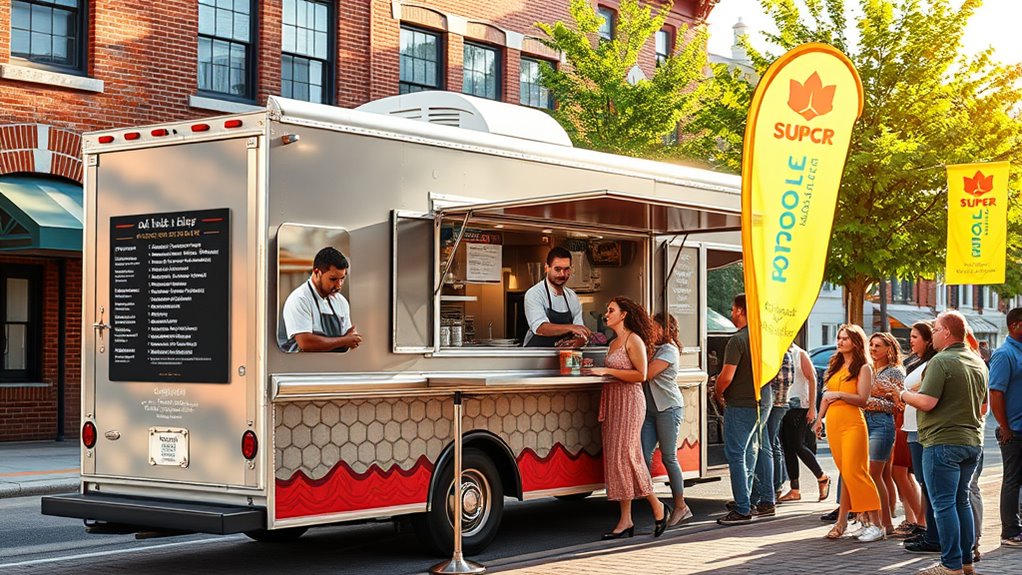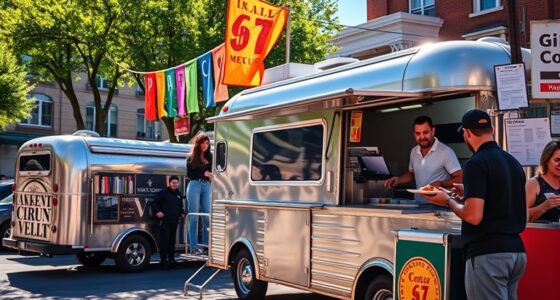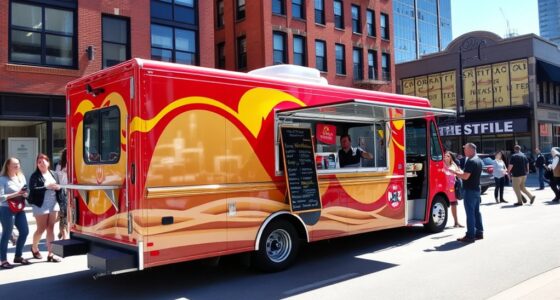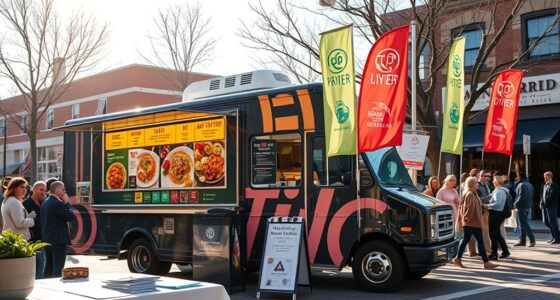To start your food truck in Concord, NH, you’ll need a City Food Service License, Peddler License, and permits for operating in non-residential zones or private event spaces. Budget about $35,000 to $150,000 for your truck, plus ongoing costs like permits, insurance, and supplies. Focus on private events or markets, and make sure your menu meets local safety standards. For effective marketing, use social media and community events. If you keep exploring, you’ll uncover key steps to launch successfully.
Key Takeaways
- Obtain necessary permits including a City of Concord Food Service License, Peddler License, proof of insurance, and ServSafe certification.
- Vending is restricted to non-residential zones; consider private properties, events, and markets for legal operation.
- Startup costs range from $40,000 to over $150,000, with ongoing expenses for permits, insurance, fuel, and maintenance.
- Develop a compliant menu emphasizing food safety, allergen labeling, and local ingredients, using approved suppliers and proper storage.
- Use social media, participate in local events, and implement targeted marketing strategies to build visibility and customer loyalty.
Navigating Permit and Licensing Requirements in Concord
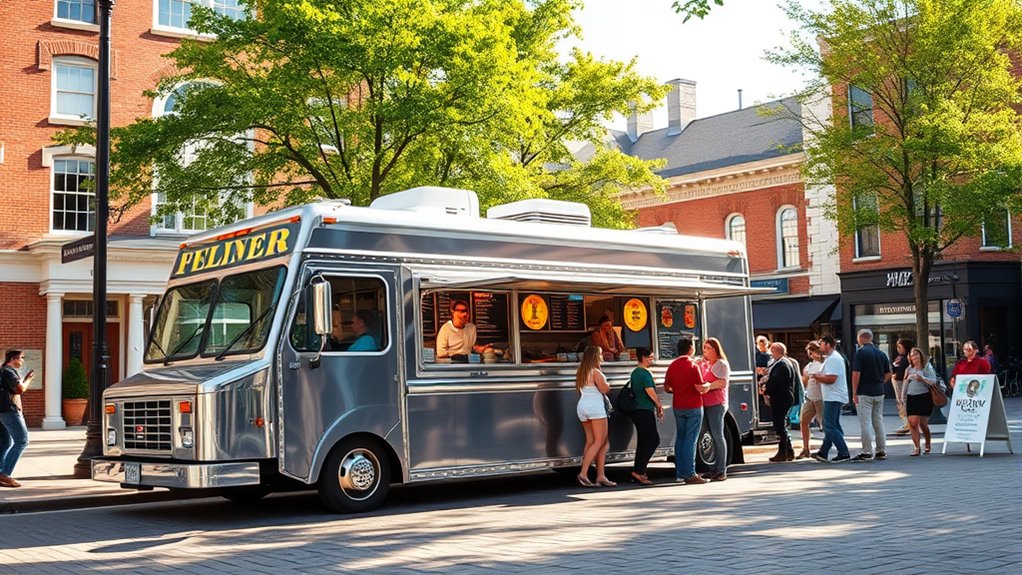
Managing permit and licensing requirements in Concord can be challenging but is essential for legally operating your food truck. First, you need a valid City of Concord Food Service License, which involves submitting an application through the Concord Code Administration and Health Licensing Services department. The $350 fee is non-refundable, and you’ll need to include proof of insurance, a ServSafe Food Protection Manager certification, and a New Hampshire Hawkers/Peddlers License. Your application must detail your proposed hours, menu, food safety plans, and handwashing facilities. Additionally, if vending in public spaces, you’ll need a City Peddler License, but this isn’t required on private property. Be aware that operating is restricted to non-residential zones, with limits on hours and parking, and health inspections guarantee ongoing compliance. Applying for the Food License online streamlines the process and allows you to track your application status. Incorporating due diligence in your planning can help ensure compliance with all local regulations and avoid potential legal issues.
Understanding Startup and Operating Expenses for Food Trucks
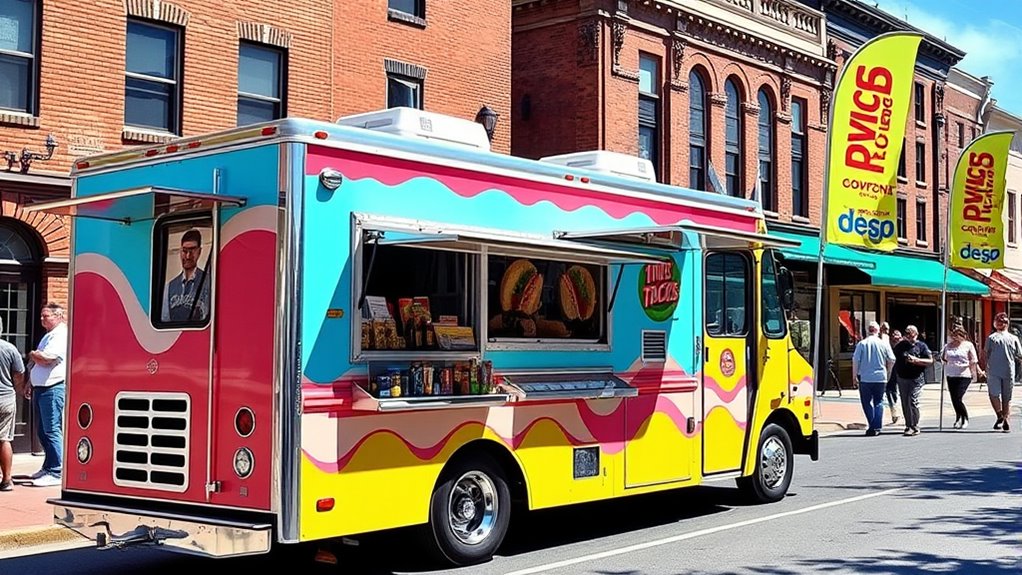
Understanding the startup and operating expenses for your food truck is essential to creating a realistic budget and ensuring your business’s success. Startup costs include vehicle purchase or rental, which can range from $35,000 to over $100,000 depending on customization and condition. Fully equipped trucks typically cost between $40,000 and $150,000, but used options can lower expenses. You’ll also need permits and licenses averaging about $1,864 nationally, plus initial inventory costs around $2,000–$3,000. It’s important to also consider rustic decor and themed equipment that align with your brand identity. Ongoing expenses include fuel, maintenance, insurance, and commissary rental, which can range from $400 to $1,200 monthly. Additionally, marketing, disposables, and utility costs must be budgeted to keep your operation running smoothly.
Locating Your Food Truck: Permissible Areas and Restrictions
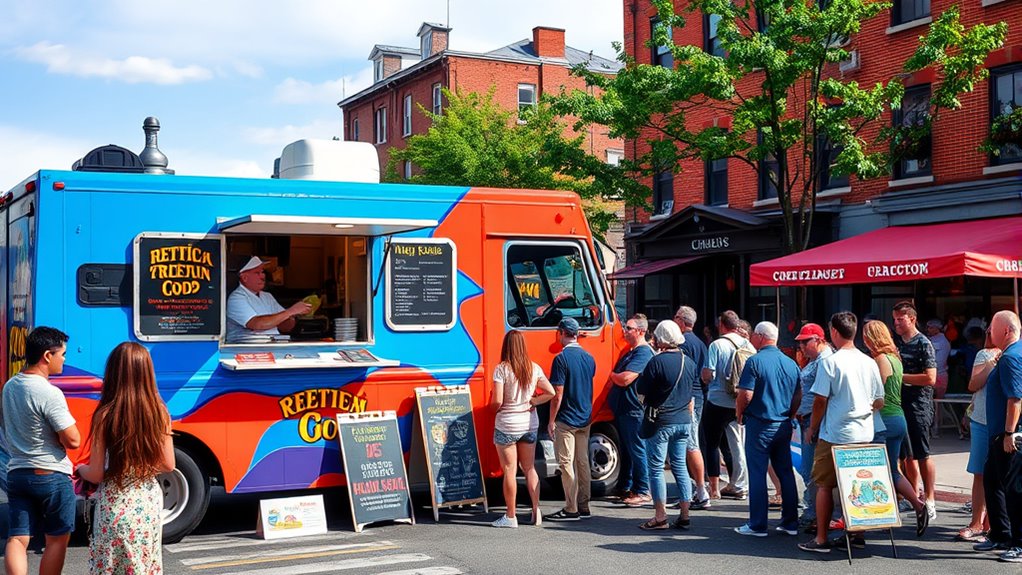
You need to focus on operating only in non-residential zones within Concord to stay legal. Residential streets are off-limits unless you’re hosting a private event, and the city enforces these restrictions strictly. However, you can explore private property or local events and markets as alternative spots to serve customers. Considering safety and quality considerations when choosing your locations can also help ensure compliance and a positive reputation.
Zoned Non-Residential Areas
In Concord, NH, food trucks can operate in certain non-residential areas, but strict rules govern where and how you can set up. You’re allowed to operate in legal parallel parking spaces along streets accessible to pedestrians, serving customers from the sidewalk side. Operating on private property is permitted with landowner permission and necessary permits. However, you cannot operate in residential zones unless for private catered events. Locations like municipal properties require approval from the Town Manager or Select Board. Keep in mind, permits and licenses are mandatory, including a food service license, peddler license, and parking permits if parking is limited. The city controls vendor density and limits permanent placements, so careful planning and approval are essential. Zoning regulations restrict locations and usage to ensure proper community planning and safety.
Restricted Residential Streets
Operating a food truck in residential streets of Concord, NH, is highly restricted by local ordinances. You can’t operate in residential zones unless invited for a private event—catering only. Parking or vending on public residential streets is prohibited, protecting neighborhood character and reducing traffic. If you’re allowed to operate, you must park in legal, non-residential spaces, avoiding driveways and traffic lanes. For meter or time-limited spots, you need a permit from the Police Department, displayed during operation. Idling over five minutes is forbidden, so your truck must be fully self-contained. Violations can lead to fines or permit revocation. The city’s regulations also aim to prevent congestion and noise disturbances in residential areas. Additionally, understanding the local ordinances can help you stay compliant and avoid penalties. Here’s a quick overview:
| Restriction | Details |
|---|---|
| Operating Zone | No in residential zones; private events only |
| Parking Restrictions | Legal spaces, permits required for meters |
| Idling Limit | Max 5 minutes; no external generators |
| Enforcement | Fines, permit revocation |
| Similar Cities | Stricter than Keene, Portsmouth |
Event and Market Opportunities
Concord offers several strategic opportunities for food trucks to expand their presence through events and markets. You can operate at private events on private property with an invitation, opening doors to new customers. Local community markets, fairs, and festivals are excellent venues to showcase your offerings. Coordinating with event organizers is essential to meet licensing and health certification requirements. Operating hours typically run from 8:00 a.m. to 9:00 p.m., with exceptions approved by health authorities. Having at least one staff member with a ServSafe Food Protection Manager Certification is mandatory. To maximize your reach, consider these options:
- Private event catering
- Community markets and festivals
- Special city-sponsored events
- Private property gatherings
- Permitted parking spaces in high-traffic areas
Additionally, being aware of security zone info can help you determine safe and compliant locations for your food truck operations.
Crafting a Menu Compliant With Local Food Safety Standards
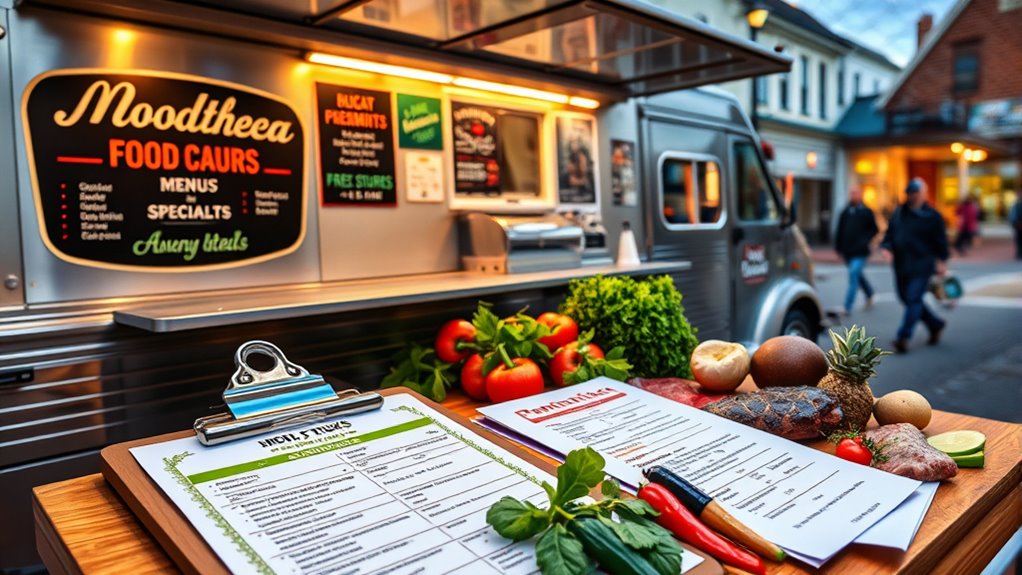
To craft a menu that meets local food safety standards, you need to select approved ingredients and follow safe preparation methods. Sourcing ingredients from licensed suppliers guarantees compliance and reduces food safety risks. Supported browsers include Google Chrome, Mozilla Firefox, and Microsoft Internet Explorer. Additionally, understanding food safety regulations in Concord ensures your menu adheres to all necessary guidelines. By focusing on these points, you can keep your menu both delicious and compliant with Concord’s health regulations.
Menu Safety Compliance
Crafting a menu that meets local food safety standards requires careful planning and clear communication. You need to identify allergens clearly, avoid or safely prepare high-risk foods, and design items suitable for a mobile environment with proper temperature and cross-contamination controls. Ensuring your menu aligns with safety guidelines helps prevent contamination and protects customers. Utilizing color accuracy and proper calibration can also help maintain consistent food presentation and quality standards.
Remember to:
- Clearly label common allergens on your menu.
- Focus on foods that can be safely prepared and held in a mobile setting.
- Avoid complex dishes with multiple ingredients that increase safety risks.
- Use writable digital or disposable menus for quick updates.
- Incorporate safe handling practices for high-risk foods to reduce contamination.
Following these steps supports compliance and customer safety on your food truck journey.
Local Ingredient Sourcing
Sourcing ingredients locally can enhance your menu’s freshness and appeal, but it’s vital to guarantee all products meet New Hampshire’s food safety standards. All food must come from approved sources that are inspected and compliant with federal, state, or local regulations. When using local producers or cottage food operations, ensure their products are stored in labeled, closed containers made from non-adulterating materials and kept at proper temperatures—41°F or below for refrigeration or 135°F or above for hot holding. This prevents spoilage and contamination. If you’re sourcing from cottage food producers, verify they operate within legal parameters, especially if selling acidified foods. Food safety standards should be strictly followed to maintain compliance and ensure consumer safety. Using compliant commercial kitchens for preparation is essential, ensuring all ingredients and dishes meet sanitary and storage regulations for a safe, compliant menu. Food storage practices must be followed diligently to prevent contamination and ensure food safety compliance.
Effective Marketing Strategies to Grow Your Food Truck Business
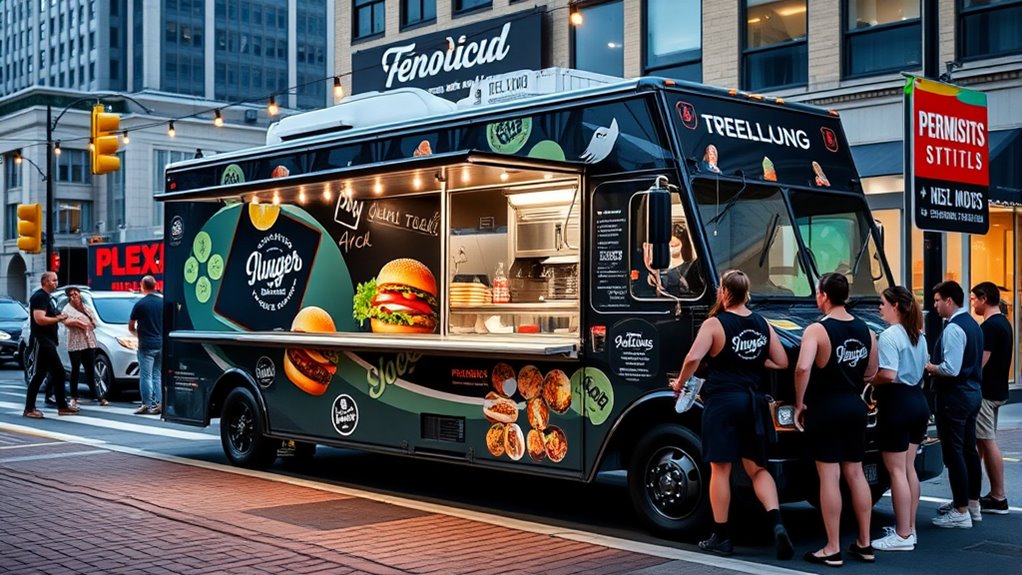
Effective marketing is essential for growing your food truck business and standing out in a competitive market. To attract more customers, leverage social media platforms like Facebook, TikTok, and Instagram Reels, which drive sales and increase visibility. Engage your audience with short-form videos and targeted ads, as 40% of customers discover trucks this way. Participate in local events and festivals to boost brand awareness and generate sales, often increasing revenue by 50%. Use data analytics and geofencing tech to optimize marketing efforts and locate customers efficiently. Implement loyalty and email programs to encourage repeat visits, with over half of trucks reporting a 30% rise in customer loyalty. Finally, align your menu with trends like healthier options and eco-friendly packaging to appeal to modern consumers. Additionally, understanding regional divorce statistics can offer insights into local demographics and community engagement that may influence marketing strategies.
Overcoming Local Challenges and Opportunities in Concord
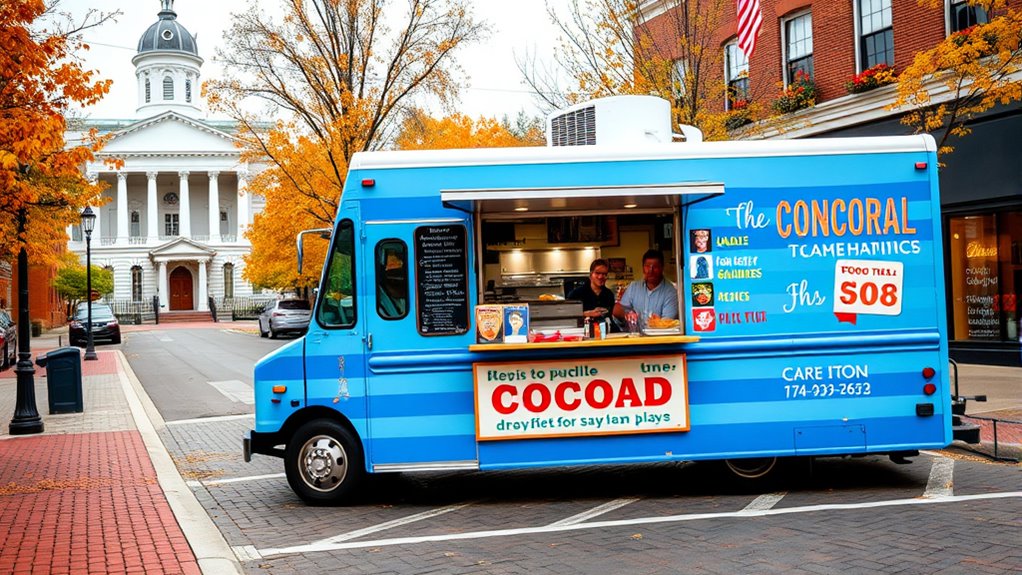
Navigating Concord’s local challenges requires strategic planning and adaptability. The high licensing costs of about $212 annually and strict regulations can be daunting, but securing a Food Service and Peddler License is essential. Focus on operating outside residential zones, as zoning laws prohibit vending in neighborhoods. To meet sanitation standards, your truck must have NSF-approved equipment, proper water systems, and temperature controls. Parking permits can add complexity, especially if operating in metered areas. To succeed, consider targeting private events, private properties, or non-residential zones where regulations are more relaxed. While restrictions limit some locations, they also provide opportunities to build a niche in event catering or private venues. Staying compliant and flexible allows you to turn these hurdles into growth avenues.
Frequently Asked Questions
Are There Any Grants Available for New Food Truck Businesses in Concord?
You’re wondering if any grants are available for new food truck businesses in Concord. While there aren’t specific grants just for food trucks, you can explore broader opportunities. The Community Development Block Grant (CDBG) and NH Community Development Investment Program (CDIP) offer funding for economic development projects, which you might leverage if your food truck aligns with community growth goals. Additionally, local incentives and financing options can help reduce startup costs.
How Do I Find Seasonal or Special Event Vending Opportunities in Concord?
You can find seasonal or special event vending opportunities in Concord by checking local event calendars, city websites, and social media pages for upcoming festivals like Winter Fest, Wings & Wheels, and Food Truck Fridays. Reach out directly to event organizers via registration links or contacts provided online. Joining local business groups, like Intown Concord, also helps you network and stay updated on new vending opportunities and regional festivals.
What Are the Specific Health Inspection Requirements for Food Trucks in Concord?
You need to guarantee your food truck meets Concord’s health inspection requirements. This means maintaining proper sanitation, controlling temperatures, and preventing cross-contamination. You must have at least one staff member with ServSafe certification, and your truck needs the City of Concord Food Service license plus a peddler’s license. During inspections, health officials will check your sanitation, equipment, and food handling practices, and you’ll need to correct any violations promptly.
Can I Operate My Food Truck in Residential Neighborhoods With a Private Event Permit?
You might think a private event permit lets you operate in residential neighborhoods, but it doesn’t. Concord’s zoning laws prohibit food trucks in residential areas, even for private events. So, unless the private event is on non-residential private property and you meet all licensing requirements, you can’t operate there. Always check with city officials first to avoid violations, and remember, permits don’t override zoning restrictions.
Are There Any Local Food Truck Associations or Networking Groups in Concord?
You’re wondering if Concord has any local food truck associations or networking groups. Currently, there aren’t any official or dedicated groups in Concord. You can, however, connect informally through platforms like Roaming Hunger or participate in regional events and markets. Building relationships at these gatherings or online communities can help you network, collaborate, and grow your food truck business in Concord and beyond.
Conclusion
Starting your food truck in Concord might seem intimidating, but with the right permits, a smart location, and an eye-catching menu, you’re well on your way. Keep your eyes open for opportunities and adapt to local rules—think of it as steering through a maze with a clear map. Stay persistent, and your efforts will pay off. Remember, success often comes to those who seize the moment and run with it.
